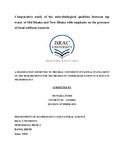Comparative study of microbiological qualities between tap water of old Dhaka and new Dhaka with emphasis on the presence of fecal coliform bacteria
Abstract
Water is one of the most important elements for survival. For leading a healthy life, water should be contamination free from any kind of water-borne organism. Water-borne organisms are a leading cause of disease and death worldwide. So the objectives of this study were to determine the microbiological quality of tap water collected from old Dhaka and new Dhaka, Bangladesh. Altogether 40 tap water samples from 10 different areas of old Dhaka and 10 different areas of new Dhaka were analyzed during summer and fall season. Through the investigation it was observed that, 9 tap water samples of 20 areas contained fecal coliform in summer and 13 were in fall. Tap water samples of 7 areas showed fecal coliform both in summer and in fall. Altogether out of 40 samples, 22 samples contained fecal coliform. Besides fecal coli-form bacteria, Coli-form such as Escherichia coli, Shigella spp. and others bacteria were also present. Out of 40 samples of 20 areas, 23 samples of 16 areas, 7 samples of 5 areas and 3 samples of 3 areas showed the growth of E.coli, Shigella spp. and Salmonella spp. respectively. In most of the samples total viable count (TVC) was above the WHO drinking water guideline value. Furthermore, there was no correlation between fecal coliform and the presence of Shigella and Salmonella spp. The study also revealed that the microbial count in summer season was more than fall season. In contrast, the fecal coliform count was more in the fall season than in the summer season. In summary by observing the results it can be concluded that the tap water quality of old Dhaka city is not satisfactory.

